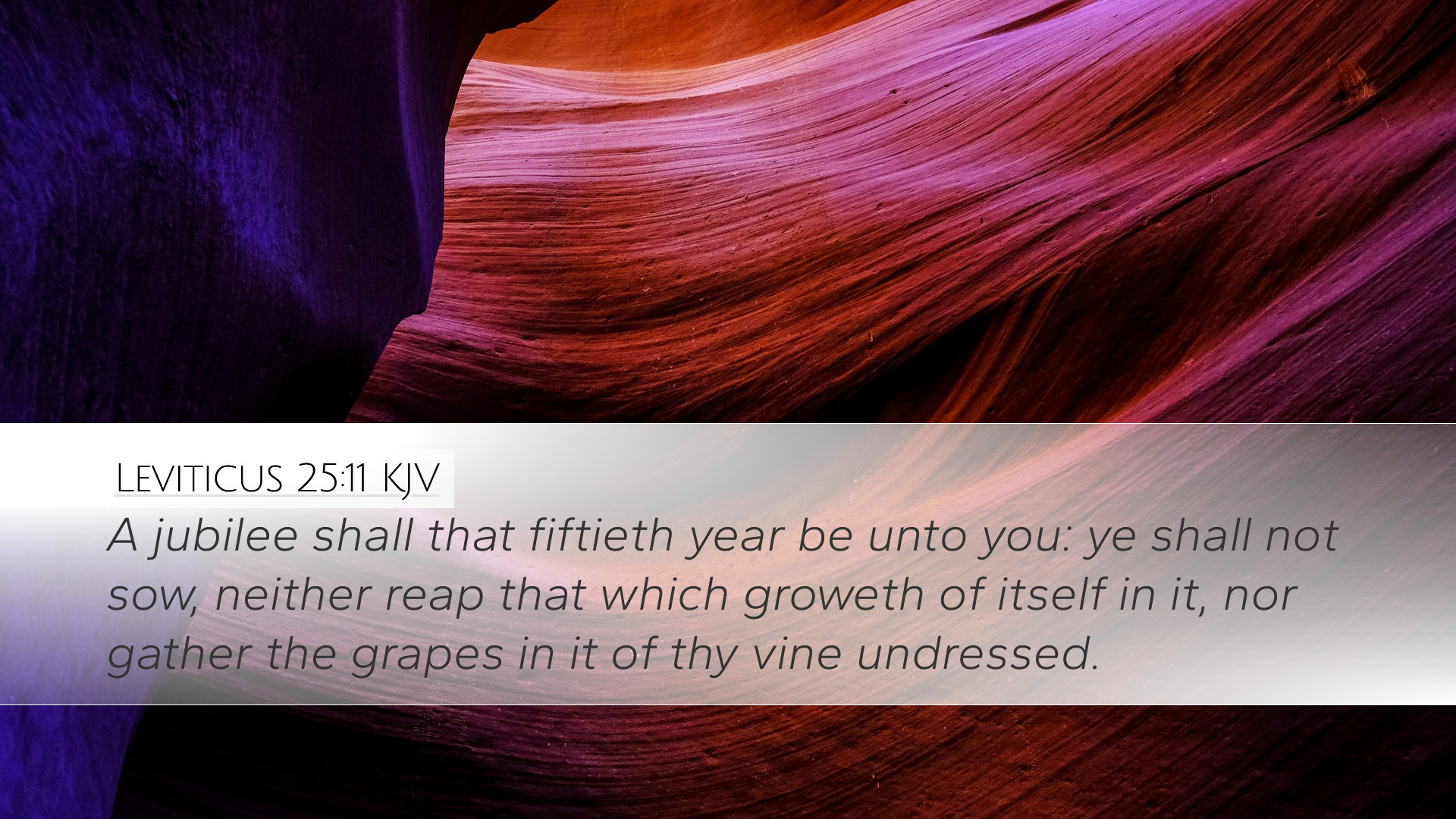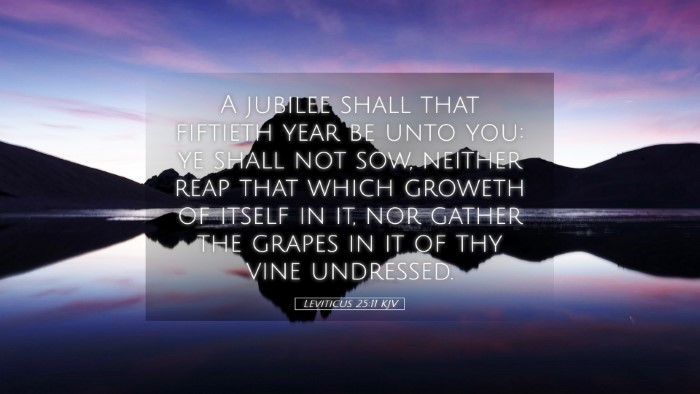Commentary on Leviticus 25:11
Verse Text: "That fiftieth year shall be a Jubilee unto you; ye shall not sow, neither reap that which groweth of itself in it, nor gather the grapes in it of thy vine undressed."
Introduction
This commentary seeks to explore the significance of the Jubilee year as described in Leviticus 25:11. The Jubilee represents a profound theological and social principle within the Mosaic Law, marking a time of rest, restoration, and the announcement of God's providence. The insights gathered from various public domain commentaries will aid in understanding this rich biblical concept.
Historical Context
The institution of the Jubilee year is placed within the broader narrative of the Israelites' covenant relationship with God. Following their exodus from Egypt and their subsequent establishment in the Promised Land, the Israelites were given specific laws relating to land use, social justice, and religious observance. The Jubilee year occurs every fifty years, following seven cycles of seven years (49 years). This framework emphasizes the importance of spiritual reflection and societal equity.
Matthew Henry's Perspective
Matthew Henry, in his comprehensive commentary, emphasizes the sacredness of time and seasons in the biblical narrative. He observes that the fiftieth year is not merely a chronological marker but a divine appointment:
- Divine Ownership: Henry notes that the land ultimately belongs to God; thus, the Jubilee serves as a reminder that human stewardship is temporary.
- Release and Restoration: In the Jubilee, there is a focus on the restoration of property and the liberation of individuals who find themselves in bondage. This reflects God’s justice and mercy, providing a mechanism for families to regain their heritage.
Albert Barnes' Commentary
Albert Barnes provides an in-depth analysis of the socio-economic implications of the Jubilee. He posits that the disallowance of agricultural activity in this year underlines the concept of divine provision:
- Ceasing Labor: Barnes highlights that during the Jubilee, the Israelites were to refrain from sowing and reaping, symbolizing a faith-based reliance on God’s provision.
- Egalitarian Principles: The structure of the Jubilee mitigates potential inequalities by ensuring that the land reverts back to its original owners, fostering a sense of community and economic equality.
Adam Clarke's Contributions
Adam Clarke offers insights into the practical implications of the Jubilee for the Israelites:
- Spiritual Renewal: Clarke elaborates that the year serves as an opportunity for spiritual rejuvenation, reflecting a deep covenant relationship with God. The cessation of agricultural activities necessitates reflection and dependence on God.
- Social Justice: He also discusses the significant role of the Jubilee in promoting justice within the community, ensuring that families who had fallen into poverty or sold themselves into servitude could be restored to their rightful position.
Theological Significance
The Jubilee year is rich in theological symbolism, illustrating profound principles that extend beyond mere agrarian laws:
- Type of Christ: Many theologians view the Jubilee as a typological representation of Christ, who offers spiritual freedom and restoration to all believers (Luke 4:18-19).
- Restoration and Redemption: The Jubilee encapsulates the themes of salvation and redemption, echoing the ultimate restoration that takes place in Christ.
The Implications for Today
In contemporary theology and practice, the concepts embodied in the Jubilee can inspire movements advocating for social justice, economic equity, and spiritual renewal. An understanding of this biblical principle encourages:
- Community Support: Initiatives that support those in financial distress reflect the heart of the Jubilee.
- Restoration Programs: Programs aimed at rehabilitating individuals and families align with the restoration themes of the Jubilee.
- Faith and Reliance on God: Encouraging individuals to trust in God’s provision, especially in times of scarcity.
Conclusion
The command in Leviticus 25:11 regarding the Jubilee year serves as a profound reminder of God's sovereignty, the importance of social justice, and the promise of restoration. By reflecting on the insights from commentaries by Matthew Henry, Albert Barnes, and Adam Clarke, we garner a richer understanding of this biblical principle that speaks volumes about God's character and His desires for humanity.


